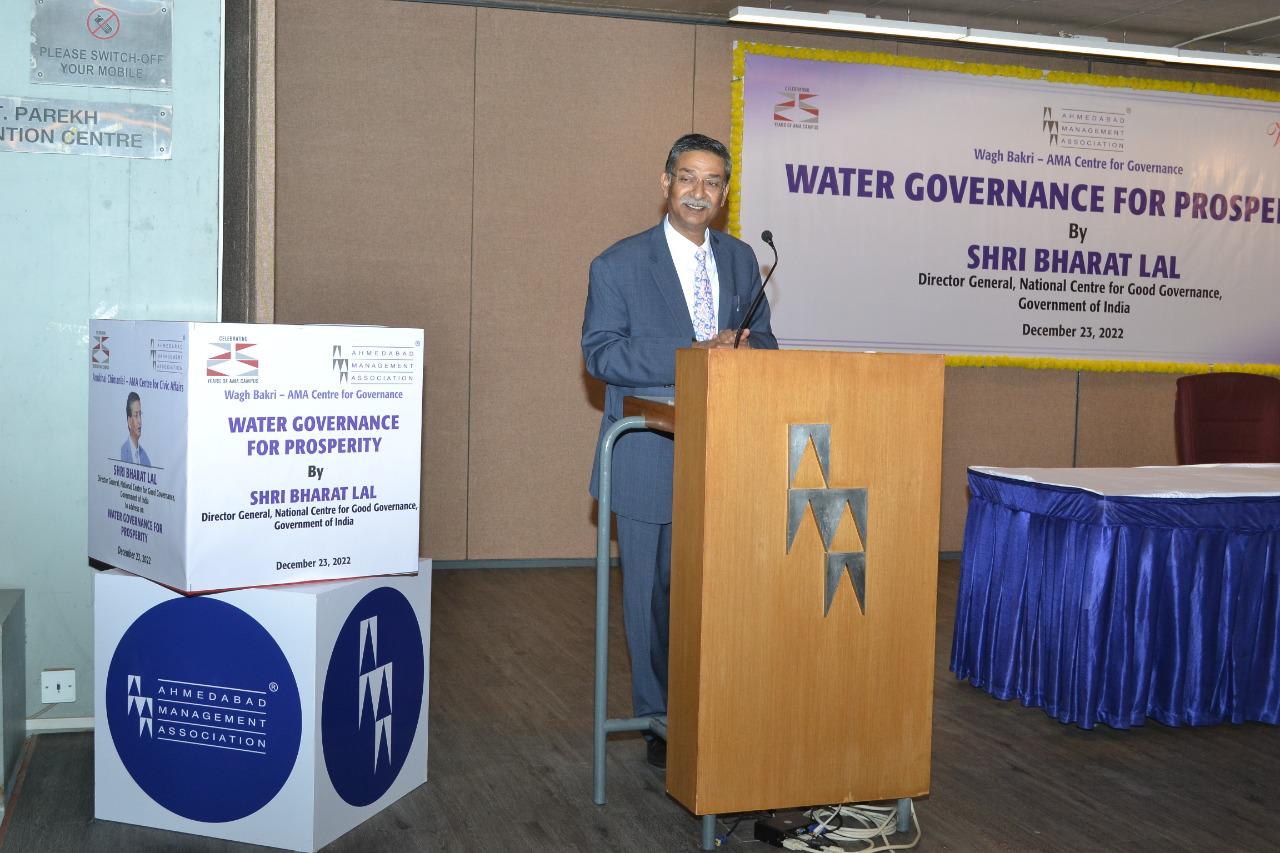“Economic and agricultural growth rate of Gujarat is in double digits owing to the work done in water sector”
December 24, 2022
Ahmedabad: Water management is an important aspect of sustainable development. Ahmedabad Management Association (AMA) organized a talk on ‘Water Governance for Prosperity’ on December 23, 2022 at 6.30 pm to increase awareness, promote water management and its importance for sustainable development. The event was organized by ‘Wagh Bakri – AMA Center for Governance’ and addressed by Shri Bharat Lal, Director General, National Center for Good Governance, Government of India.
In his address, Shri Bharat Lal said, “ There was a time of severe water shortage in Gujarat. The state faced severe droughts. Seeing the hardwork of the people and the industrial atmosphere in Gujarat, we thought that the state has the potential to reach unscalable heights if the problem of water is solved here.”
By studying Gujarat’s low economic growth rate and other problems, we realized that severe water scarcity was the biggest hindrance in the overall development of Gujarat, in its social and economic sectors, poverty alleviation etc.
When Shri Narendra Modi became the Chief Minister of Gujarat in 2001, he focused on three major problems. One is the rehabilitation of Kutch district after the earthquake, severe drought and water scarcity and low economic growth rate.
We realized that Gujarat can reach new heights of development if the problem of water scarcity is solved. After understanding this, you can see the results of various schemes and projects implemented in the state today.
Explaining the need and importance of water, Shri Bharat Lal said, “ The population of India in 1921 was around 36 crores, which has increased to 140 crores today. As the population increased, various economic activities increased and so did the prosperity of people. Over time, this led to the increase in consumption of water. There was a time when more than 5000 cubic meters of water was available per person..As a result we need more and more water to meet the growing need.”
Shri Bharat Lal lauded the work done by Gujarat in water sector. He said that the state has become a pioneer in water management. He talked about Narmada Dam, Canal Network, Water Grid etc. and appreciated the state’s efforts in water harvesting through public participation in rural areas. During monsoons, people make dedicated efforts to store rainwater. This has led to an increase in the level of groundwater.
The results are visible. In 2000, the economic growth rate of Gujarat was in single digits i.e. 1% or 2%, and in the following decade, the economic growth rate was in double digits. To add, the state’s agriculture sector also registered a double digit growth rate. By citing this example he explained how prosperity of the state can be a major factor in boosting infrastructure development.
Mr. Bharat Lal said that various studies concluded that India needs to focus on water management. When Shri Narendra Modi became the Prime Minister of India in 2014, the first issue he addressed was that of water. There was a big problem of open defecation in the country. In such a situation, it was impossible to store water. This was main reason why Shri Modi first launched the ‘Swachh Bharat Abhiyan’ first followed by the ‘Jal Jeevan Mission’. This strategy has been successfully implemented in Gujarat. The state has done noteworthy work in water management and conservation through SAUNI scheme, Sujalam-Sufalam Jal Abhiyan etc.
The same strategy was implemented at the national level. From 2014 to 2019, efforts were made to make India an ODF-country through the Swachh Bharat Mission. From 2019, two programs for water were launched, one ‘Jal Shakti Abhiyan’ for rainwater harvesting and the other ‘Jal Jeevan Mission’ to provide potable water for every house through taps. He lauded Gujarat’s work in Jal Jeevan Mission.
In his concluding remarks, he said that earlier there was no dedicated course on Water and Sanitation and Public Health Engineering. Keeping this in mind, we have decided to set up National Institutes to study Water and Sanitation. Such National Institutes will be started at two locations, one at IIT, Gandhinagar and the other at IIT, Chennai. Along with this, five other institutes, IIT-Guwahati, IIT-Kanpur, IIT-Jodhpur, NTS-Mumbai and IIM Bangalore will also be affiliated with this course to create a knowledge network for water and sanitation.
Professionals and students associated with water security were present during this talk. The event was also followed by a live Q&A with the audience. DeshGujarat
Recent Stories
- ISKCON Ahmedabad Mandir Protests Over Justice For Hindus In Bangladesh
- Gujarat Gas Hikes CNG Prices Again, Impacting 22 Lakh Vehicle Owners
- Dhari to become 160th Municipality in Gujarat
- Railway Minister visits Austrian company's largest manufacturing plant in the world in Gujarat
- Road-side food cart operators and local residents clash in Vastrapur
- 13-Day Long Saptak Music Festival 2025 to Honor Legacy of Co-Founder Manju Mehta
- Trump Names Kash Patel As New FBI Director; Know More About His Gujarati Origin
